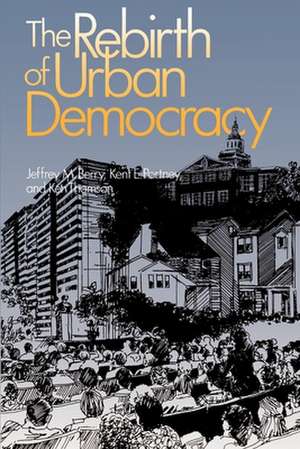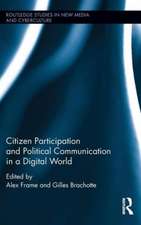The Rebirth of Urban Democracy
Autor Jeffrey M. Berry, Kent E. Portney, Ken Thomsonen Limba Engleză Paperback – feb 1993
In an era when government seems remote and difficult to approach, participatory democracy may seem a hopelessly romantic notion. Yet nothing is more crucial to the future of American democracy than to develop some way of spurring greater citizen participation. In this important book, Jeffrey Berry, Ken Portney, and Ken Thompson examine cities that have created systems of neighborhood government and incorporated citizens in public policymaking. Through careful research and analysis, the authors find that neighborhood based participation is the key to revitalizing American democracy. The Rebirth of Urban Democracy provides a thorough examination of five cities with strong citizen participation programs--Birmingham, Dayton, Portland, St. Paul, and San Antonio. In each city, the authors explore whether neighborhood associations encourage more people to participate; whether these associations are able to promote policy responsiveness on the art of local governments; and whether participation in these associations increases the capacity of people to take part in government. Finally, the authors outline the steps that can be taken to increase political participation in urban America. Berry, Portney, and Thomson show that citizens in participatory programs are able to get their issues on the public agenda and develop a stronger sense of community, greater trust in government officials, and more confidence in the political system. From a rigorous evaluation of surveys and interviews with thousands of citizens and policymakers, the authors also find that central governments in these cities are highly responsive to their neighborhoods and that less conflict exists among citizens and policymakers. The authors assert that these programs can provide a blueprint for major reform in cities across the country. They outline the components for successful participation programs and offer recommendations for those who want to get involved. They demonstrate that participation systems can influence citizens to become more knowledgeable, more productive, and more confident in government; and can provide more governments with a mechanism for being more responsive in setting priorities and formulating polices that closely approximate the true preferences of the people.
Preț: 221.16 lei
Nou
Puncte Express: 332
Preț estimativ în valută:
42.32€ • 44.02$ • 34.94£
42.32€ • 44.02$ • 34.94£
Carte tipărită la comandă
Livrare economică 12-26 aprilie
Preluare comenzi: 021 569.72.76
Specificații
ISBN-13: 9780815709275
ISBN-10: 0815709277
Pagini: 342
Dimensiuni: 152 x 229 x 22 mm
Greutate: 0.52 kg
Ediția:New.
Editura: Brookings Institution Press
Colecția Brookings Institution Press
ISBN-10: 0815709277
Pagini: 342
Dimensiuni: 152 x 229 x 22 mm
Greutate: 0.52 kg
Ediția:New.
Editura: Brookings Institution Press
Colecția Brookings Institution Press
Notă biografică
Descriere
In an era when government seems remote and difficult to approach, participatory democracy may seem a hopelessly romantic notion. Yet nothing is more crucial to the future of American democracy than to develop some way of spurring greater citizen participation. In this important book, Jeffrey Berry, Ken Portney, and Ken Thompson examine cities that have created systems of neighborhood government and incorporated citizens in public policymaking. Through careful research and analysis, the authors find that neighborhood based participation is the key to revitalizing American democracy. The Rebirth of Urban Democracy provides a thorough examination of five cities with strong citizen participation programs--Birmingham, Dayton, Portland, St. Paul, and San Antonio. In each city, the authors explore whether neighborhood associations encourage more people to participate; whether these associations are able to promote policy responsiveness on the art of local governments; and whether participation in these associations increases the capacity of people to take part in government. Finally, the authors outline the steps that can be taken to increase political participation in urban America. Berry, Portney, and Thomson show that citizens in participatory programs are able to get their issues on the public agenda and develop a stronger sense of community, greater trust in government officials, and more confidence in the political system. From a rigorous evaluation of surveys and interviews with thousands of citizens and policymakers, the authors also find that central governments in these cities are highly responsive to their neighborhoods and that less conflict exists among citizens and policymakers. The authors assert that these programs can provide a blueprint for major reform in cities across the country. They outline the components for successful participation programs and offer recommendations for those who want to get involved. They demonstrate that participatio











